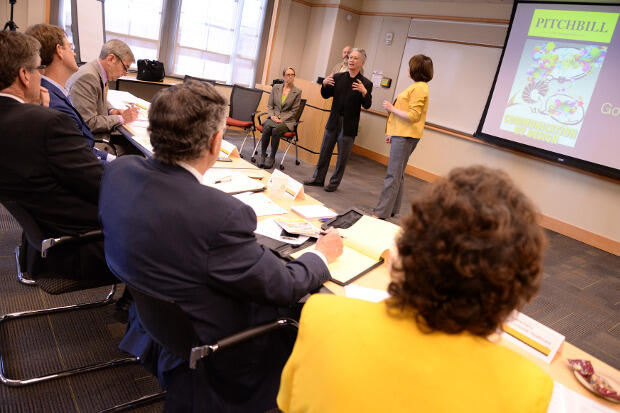
March 22, 2016
Innovative projects land prize money at EPIC Challenge
Share this story
The Virginia Commonwealth University School of Business’ first-ever EPIC Challenge yielded not one winner, but five.
“All the EPIC Challenge projects were wonderful, so much so that the judges had to actually put on our boxing gloves to allocate our pot of money,” said judge and VCU School of Business Foundation board member Juanita Leatherberry.
The School of Business issued the challenge — a pathway to develop ideas that fit the school’s EPIC spirit — in the fall. Unlike similar competitions, the EPIC Challenge is open not just to business faculty and students, but to staff and alumni as well. Applicants must partner with at least one person outside of their discipline to come up with innovative ideas and projects. Each team is assigned a mentor from the local business community.
Ken Kahn, Ph.D., senior associate dean, noted that he has not seen a similar endeavor at any other university and called the challenge “a distinguishing feature of what we’re trying to do.”
Thirty-five teams answered the call, but only five made it to the finals. Those five pitched their ideas to a panel of business-savvy judges on Friday at Snead Hall, in a “Shark Tank”-styled showdown between inventors and investors. The VCU School of Business Foundation provided the $250,000 in prize money, as well as an additional $500,000 for competitions over the next two years. Rather than award the bulk to one team, each team will receive between $30,000 and $70,000 to develop their ideas.

Team Experimential Learning’s idea is an app that brings instructor research into the classroom in a creative way that makes learning fun for students. The project relies on students having their phones with them (“They’ll have them,” the team noted. “They always do.”).
Bill Weber of New Richmond Ventures Board of Advisors mentored team members Michaela Bearden, Alisa Brink, Stephen Day, Suzanne Makarem, Ed Millner, Doug Pugh and Dan Salandro.

Communication by Design’s team wants to coach faculty and students in writing and presentation. “If you have a great idea and all you do is mumble, it doesn’t matter,” team member Shannon Mitchell said. “You’re not going to rise to the top.”
Neil Patel of The Martin Agency and Jack Hannibal, media and speaking coach, mentored Laural Adams, Aaron Anderson, Susan Coombes, Joseph Coombs, Blakley Davis, Marisa Guida, David Leong, Doug Miller, Shannon Mitchell, Paul Nolde, Chris Reina and Sam Seeley.

EPIC Learning seeks to replace select courses with a hybrid course. The lecture-style delivery twice a week no longer works for today’s students, who learn differently from their predecessors. Students leave the classroom and, if they’ve forgotten a point, that lecture is gone. In the hybrid course, the instructor delivers core concepts digitally online. The courses can springboard directly from that with active engaged discussion and problem-solving.
Cathy Doss of Fannie Mae mentored Caleb Cox, Chris Herrington, Molly Ransone, Jens Schubert and Carol Scotese.

The Money Spot envisions a student-to-student peer financial advising network to specifically tackle college debt and student loans. Team members want students to start thinking about their budget as a whole, to learn how to make a plan, and to be financially literate.
Jane Watkins of Virginia Credit Union and Mark Newfield of Northwestern Mutual mentored Chintal Desai, Rachel Maddux, John McFarland and Dan Salandro.

Ramp It Up identifies the problem of transfer students who do not perform as well as their peers who entered as freshmen. Transfer shock — a drop in GPA when transitioning to a new school — is highly prevalent. With intervention programs, the university can absorb that transfer shock.
Gary Rhodes of Reynolds Community College mentored Lacie Bittinger, Claire Calise, Michal Coffey, Katherine Drumm, Artis Gordon, Mandy James, Vinnie Merida and Amy Sarcinella.
Judges were:
- John Adams, chairman, The Martin Agency
- Bill Ginther, corporate executive vice president, SunTrust Bank (retired)
- Juanita Leatherberry, assistant vice president, Pfizer Consumer Healthcare (retired)
- Jack Nelson, executive vice president & CTO, Altria Group Inc. (retired)
- Pam Royall, head of research, Royall & Co.
- John Pullen, president and chief growth officer, Luck Cos.
- Rob Shama, president, Afton Chemical
Subscribe for free to the weekly VCU News email newsletter at http://newsletter.news.vcu.edu/ and receive a selection of stories, videos, photos, news clips and event listings in your inbox every Thursday.
Subscribe to VCU News
Subscribe to VCU News at newsletter.vcu.edu and receive a selection of stories, videos, photos, news clips and event listings in your inbox.












